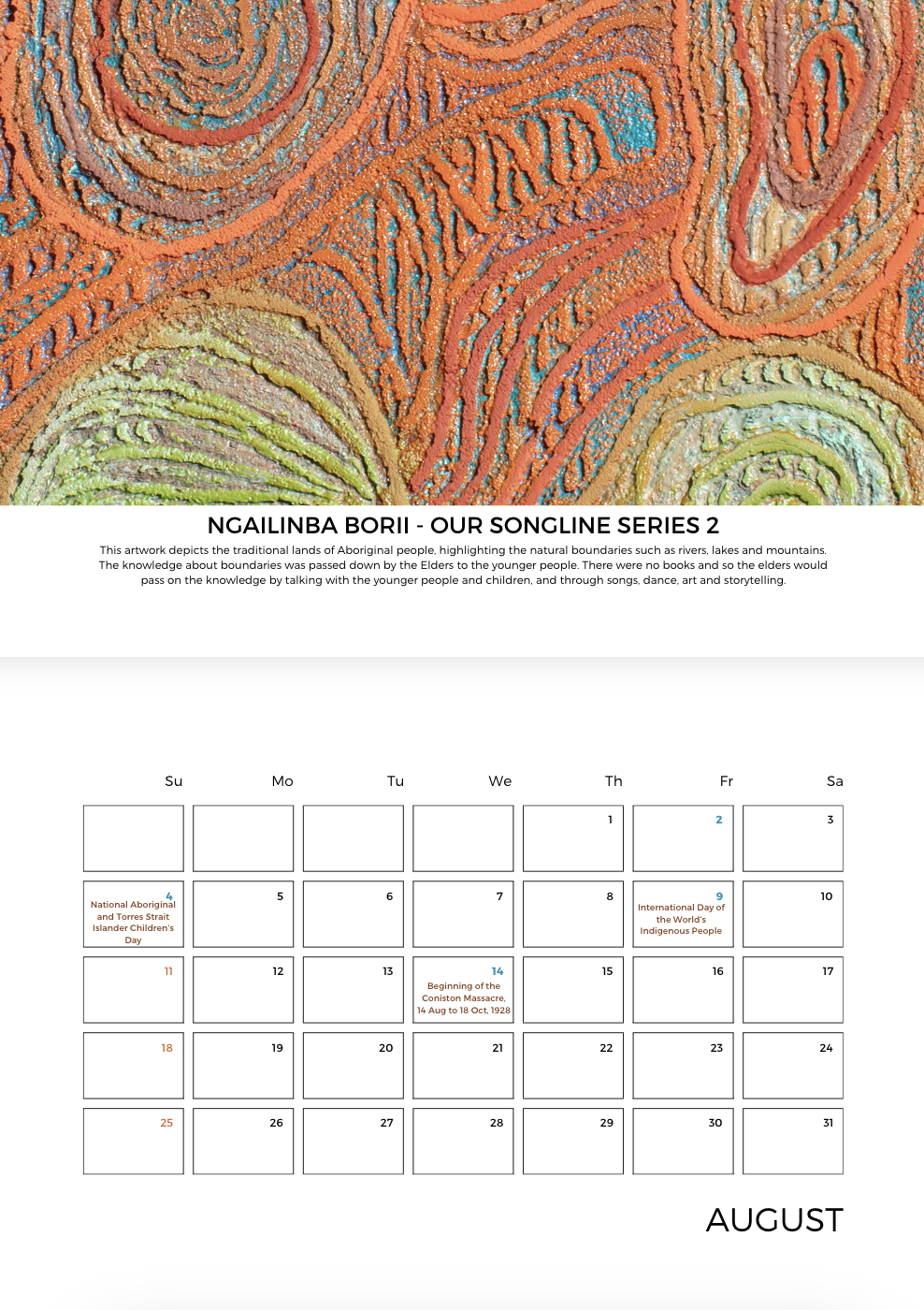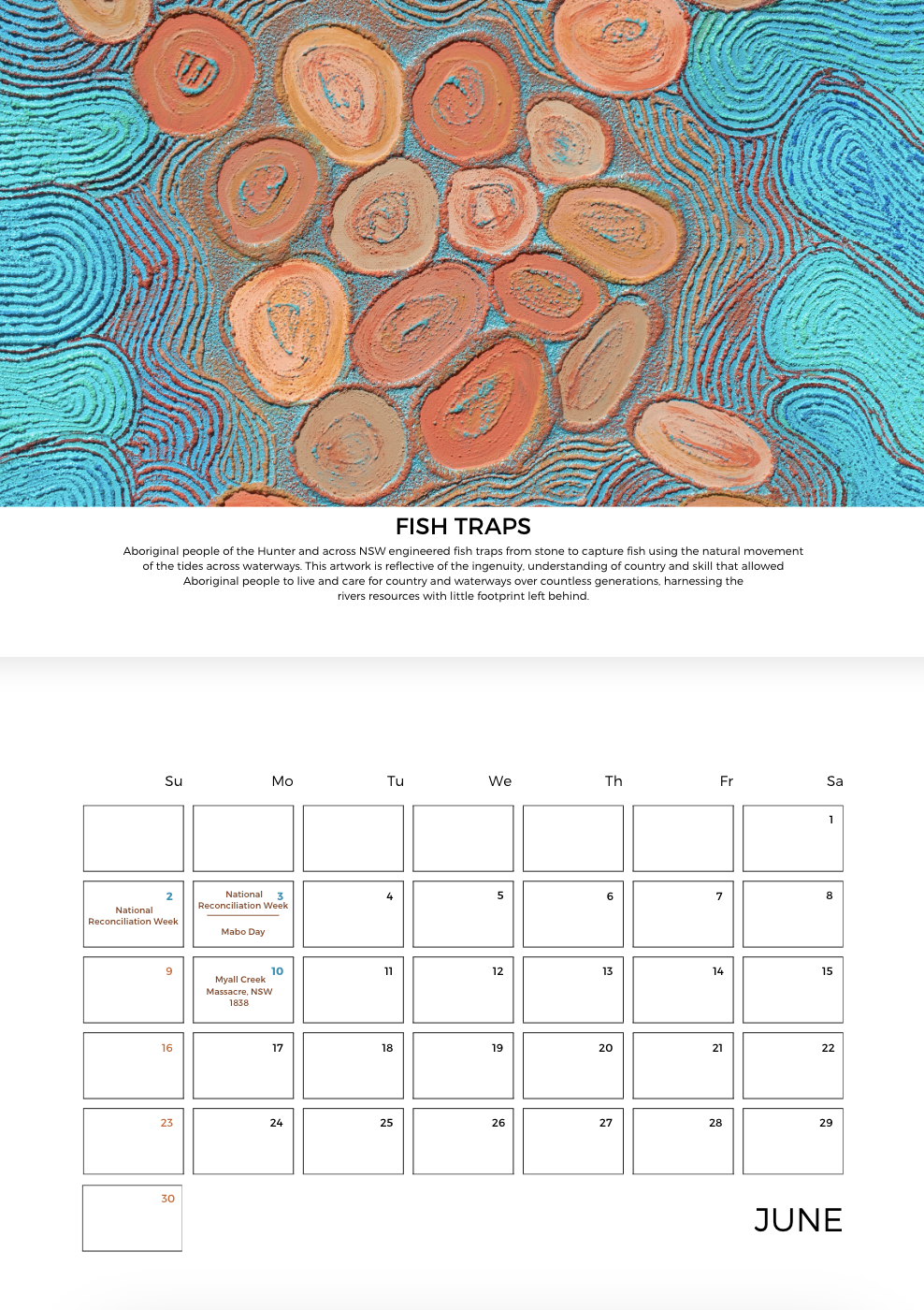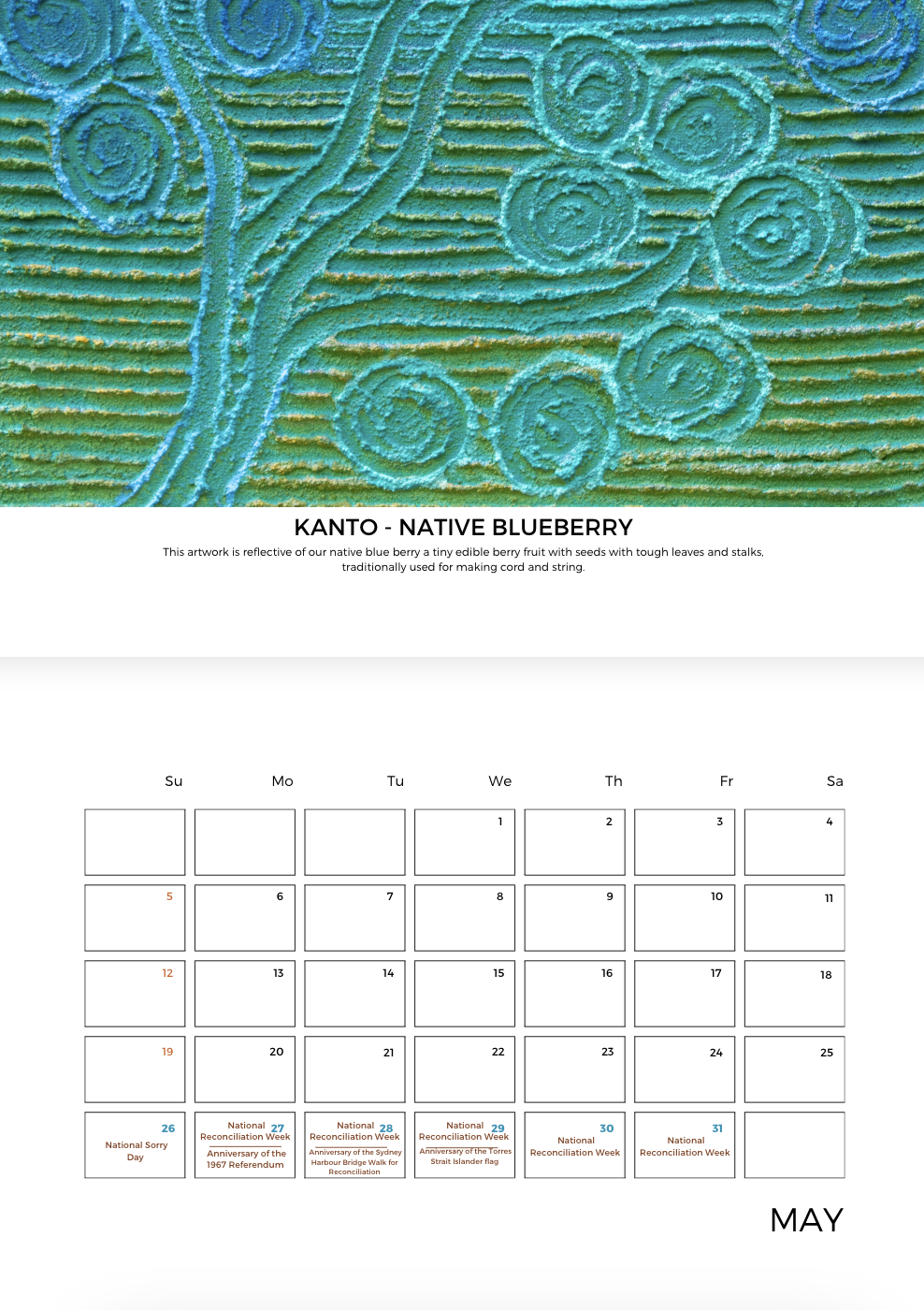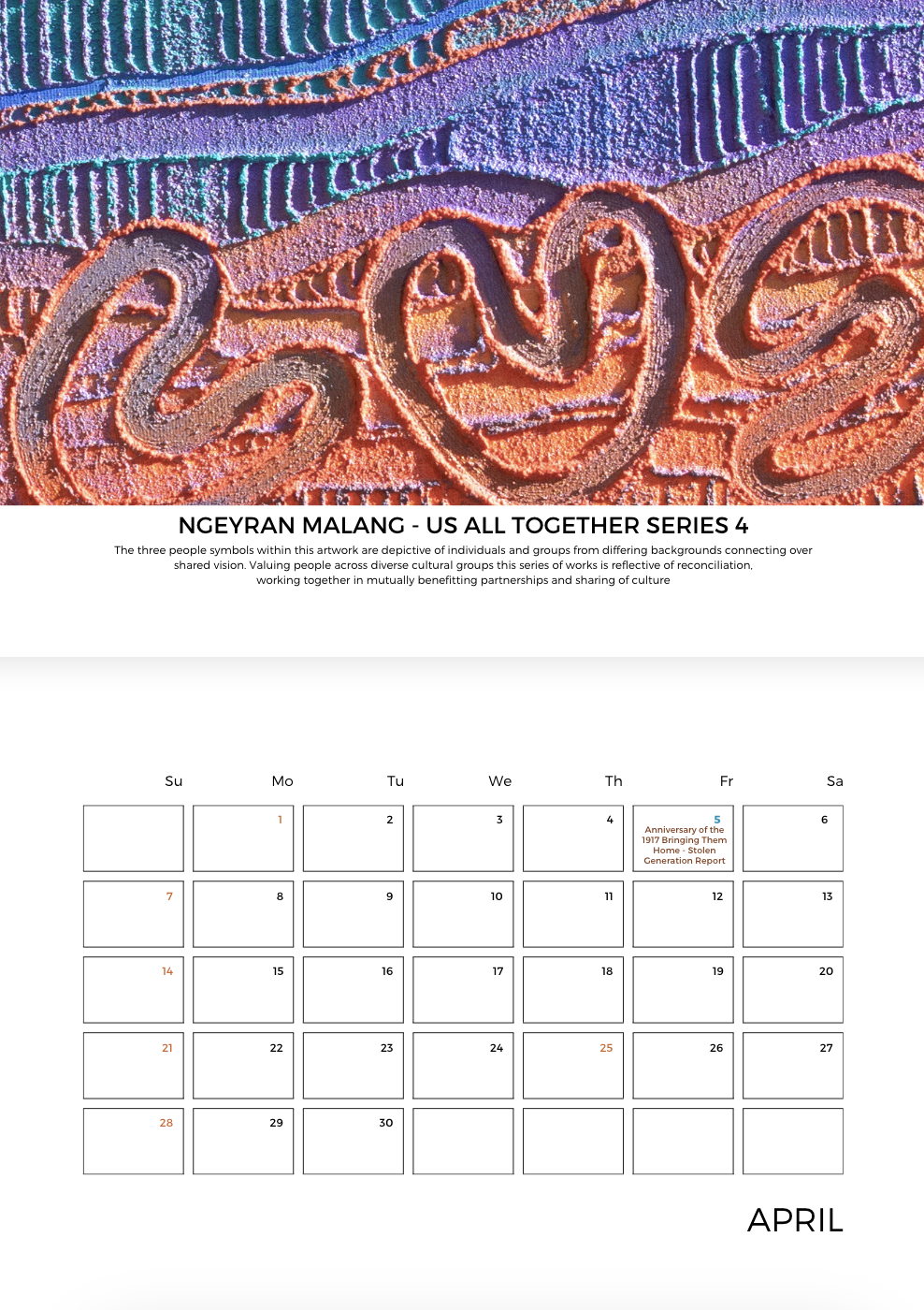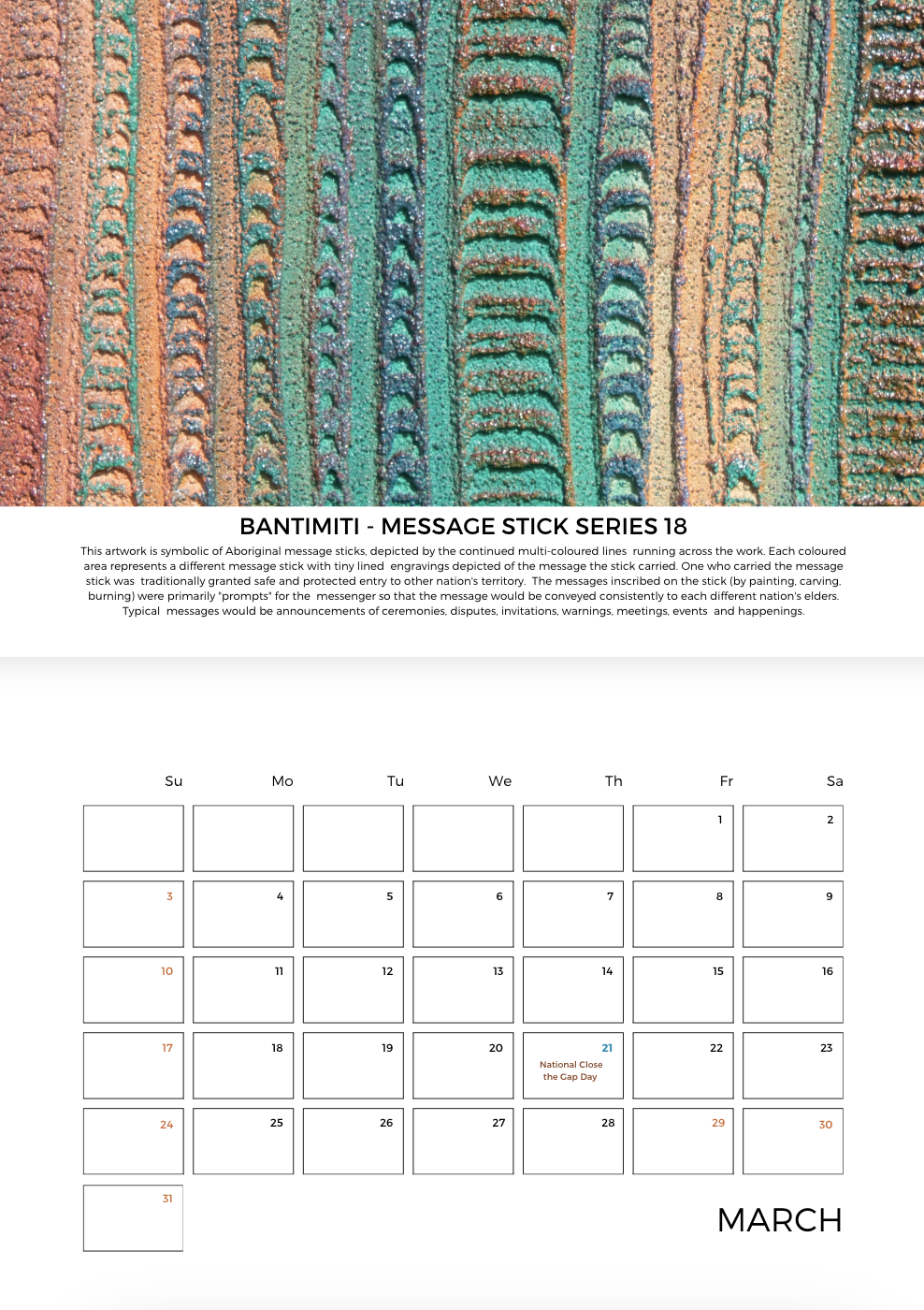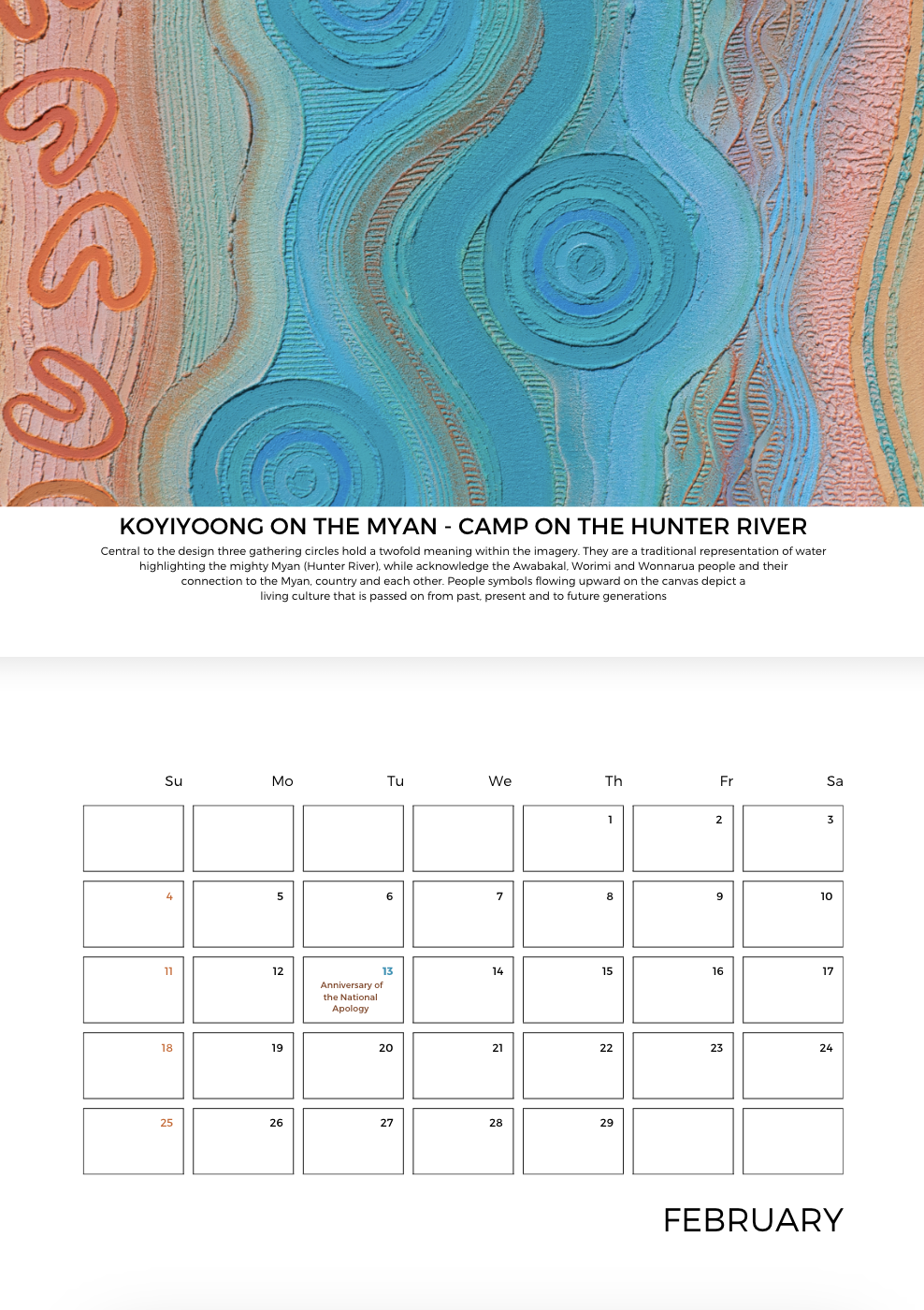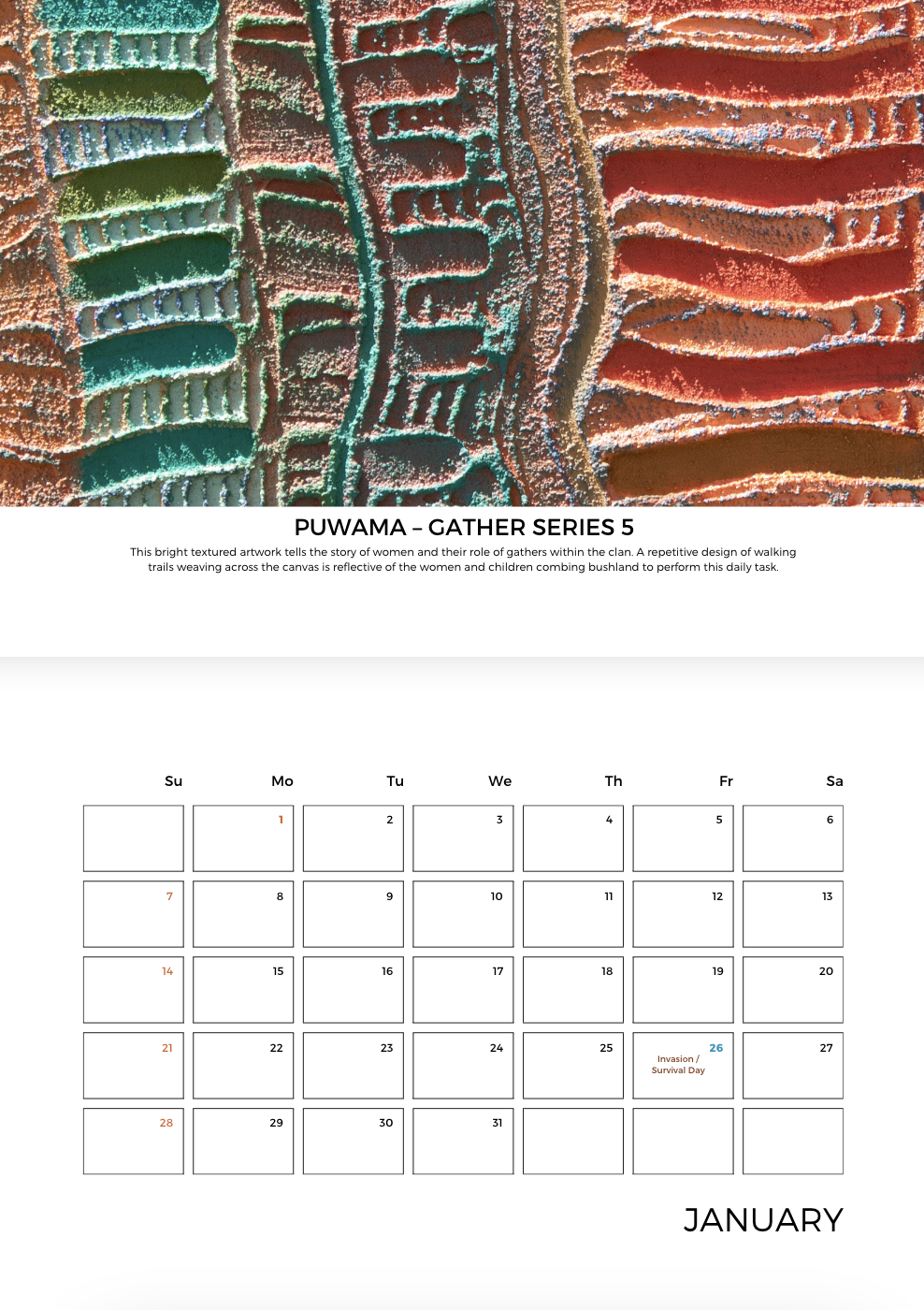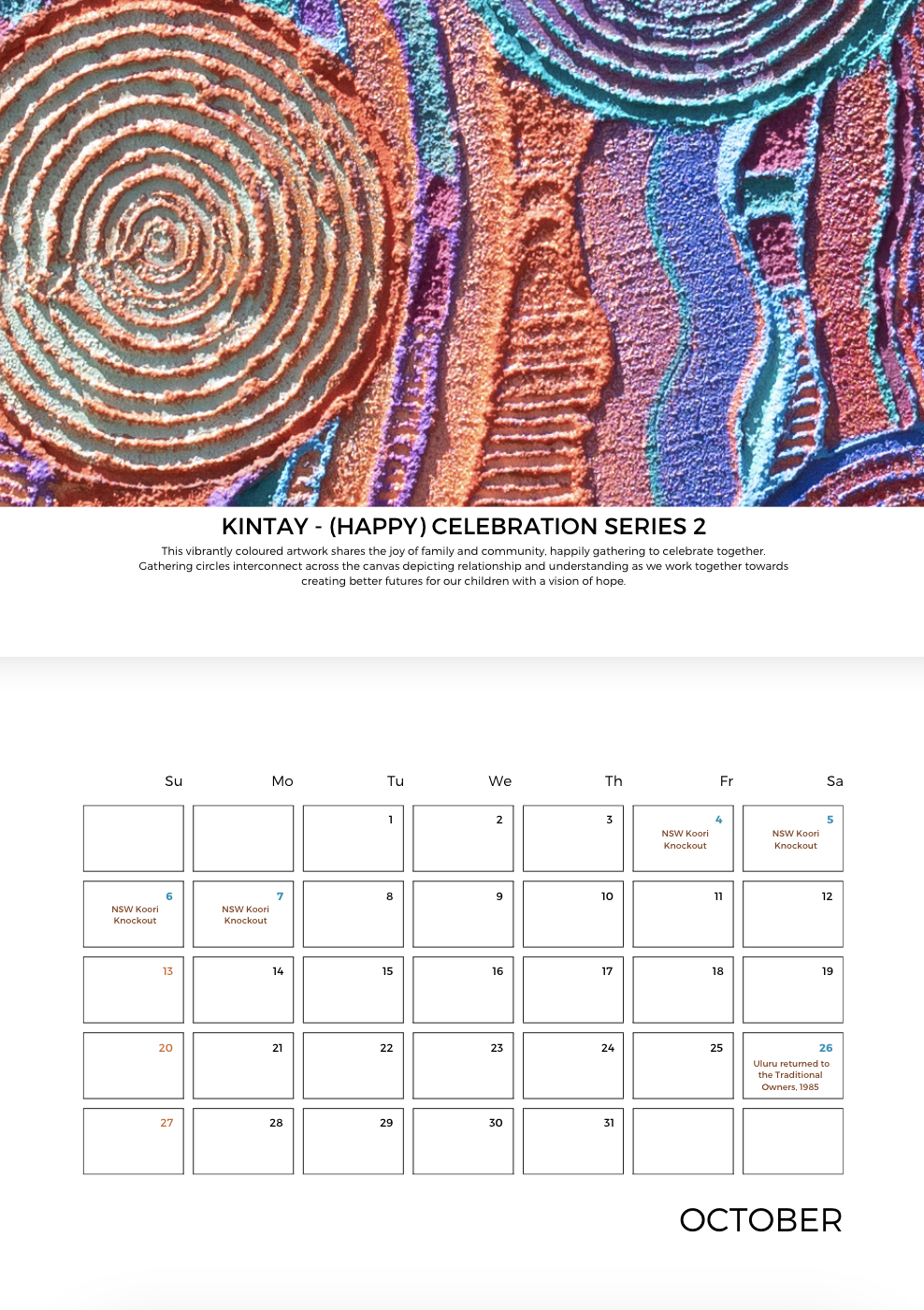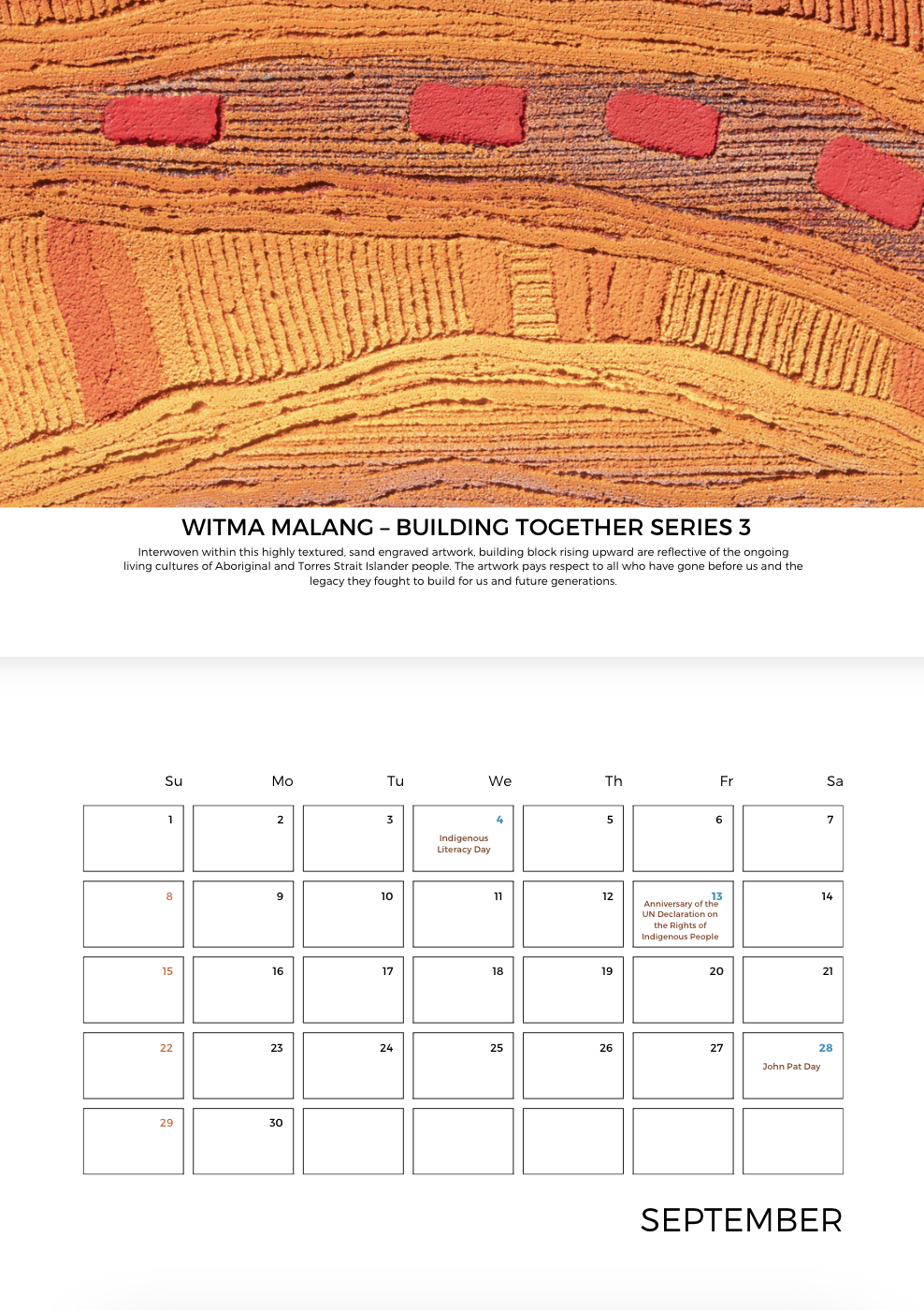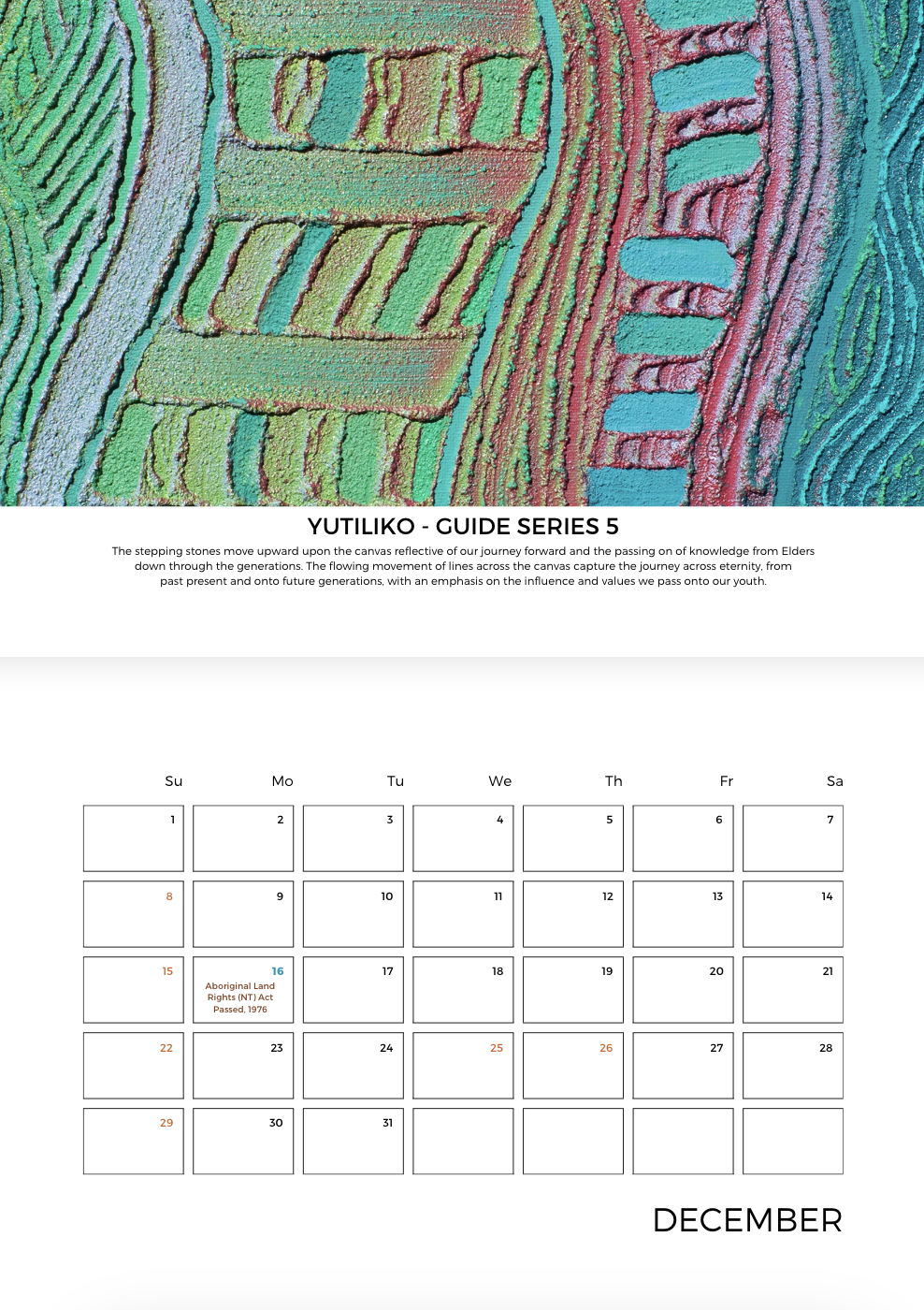Understanding our shared history is one of Evolve’s Seven Steps to Reconciliation and Allyship™, our tried-and-tested framework for building confidence to show up for and support Aboriginal and Torres Strait Islander people and communities.
In our 2024 Calendar, you’ll find dates that document the 200+ year fight for the rights of First Nations people in Australia, providing important opportunities to acknowledge the trials and celebrate the resilience of the world’s oldest surviving culture.
This year we’ve partnered again with Aboriginal artist, Saretta Fielding to create a calendar that is not only educational but also a beautiful addition to any home or workplace. These calendars are stunning and meaningful gifts for yourself and your colleagues, friends and family.
You can purchase the limited edition wall calendar, and original artworks, from saretta.com.au
By submitting your details, you agree to receive occasional, educational emails (you can opt out at anytime).
Purchase The Limited Edition 2024 Wall Calendar
All proceeds from the sale of our wall calendars will be donated to Malang Indigenous Corporation, a not-for-profit established by Saretta Art & Design to create opportunities towards sustainable economic and social inclusion for Aboriginal people.
Frequently Asked Questions About Indigenous Seasons, Dates & Calendars
- January 26: Invasion Day / Survival Day
While Australians are encouraged to celebrate Australia Day as the day Australia was founded, Aboriginal and Torres Strait Islander people mourn the impacts of colonisation. - February 13: Anniversary of the National Apology
On 13 February 2008, Prime Minister Kevin Rudd made a formal apology to Australia’s Indigenous peoples, particularly to the Stolen Generations whose lives had been deeply affected and traumatised by past government policies of forced child removal and Indigenous assimilation. - March 16: National Close the Gap Day
National Close the Gap Day is a time for all Australians to come together and commit to achieving equity for Aboriginal and Torres Strait Islander people. - April 5: Bringing Them Home – Stolen Generation Report Anniversary
Bringing Them Home is the 1997 Australian Report of the National Inquiry into the Separation of Aboriginal and Torres Strait Islander Children from Their Families. The report marked a pivotal moment in the controversy that has come to be known as the Stolen Generations. - May 26: National Sorry Day
National Sorry Day offers the community the opportunity to acknowledge the impact of the policies spanning more than 150 years of forcible removal of Aboriginal and Torres Strait Islander children from their families. - May 27: Anniversary of the successful 1967 Referendum
In 1967 over 90% of Australians voted in a Referendum to allow Aboriginal and Torres Strait Islander people to be counted in the census.The Referendum also gave the Commonwealth Government power to make national laws on behalf of Aboriginal and Torres Strait Islander people. - May 27 – 3 June: National Reconciliation Week
National Reconciliation Week offers people across Australia the opportunity to focus on reconciliation, to hear about the cultures and histories of Australia’s Aboriginal and Torres Strait Islander peoples, and to explore new and better ways of meeting challenges in our communities. - May 28: Anniversary of the Sydney Bridge Walk for Reconciliation
250,000 Australians walked across the Sydney Harbour Bridge on this day in 2000 to show their support for Reconciliation in Australia.. Similar bridge walks in many towns and cities followed. - May 29:: Anniversary of the Torres Strait Islander flag
Every National Reconciliation Week on 29 May, we acknowledge and pay tribute to Bernard Namok Senior on the anniversary of the Torres Strait Islander Flag - May 27 – 3 June: National Reconciliation Week
National Reconciliation Week offers people across Australia the opportunity to focus on reconciliation, to hear about the cultures and histories of Australia’s Aboriginal and Torres Strait Islander peoples, and to explore new and better ways of meeting challenges in our communities. - June 3: Mabo Day
This marks the anniversary of the High Court of Australia’s historical judgement, which acknowledged the existence of Native Title. On this day in 1992, the court upheld the claim by Eddie ‘Koiki’ Mabo on behalf of the Meriam people in the Torres Strait that they had occupied the Islands of Mer for hundreds of years before the arrival of the British. The decision overturned a legal fiction that Australia was Terra Nullius (a land belonging to no one) at the time of British colonisation. - June 10: Myall Creek Massacre 1838
There have been many Aboriginal massacres throughout Australia’s colonial history but the most famous of these is that which occurred at Myall Creek near Inverell in NSW. On this day, twelve colonists killed at least least 28 unarmed Indigenous people of the Gamilaroi nation. The massacre is infamous for the sole reason it was the one and only time that the perpetrators were found guilty of murder and hanged. Although there were other massacres that occurred after this, since then no-one has gone punished for their crimes. - July 1: Coming Of The Light – Torres Strait Islands
Many island cultures have traditionally celebrated a Coming of the Light festival in some form or other. On this day it is celebrated in the Torres Strait Islands. - July 4-11: NAIDOC Week
Celebrations are held across Australia each July to celebrate the history, culture and achievements of Aboriginal and Torres Strait Islander peoples. - August 4: National Aboriginal and Torres Strait Islander Children’s Day National Aboriginal and Torres Strait Islander Children’s Day and the week leading up to it, is a time for Aboriginal and Torres Strait Islander families to celebrate the strengths and culture of their children.
- August 9: International Day of the World’s Indigenous Peoples
The International Day of the World’s Indigenous Peoples is observed on August 9 each year to promote and protect the rights of the world’s Indigenous population. This event also recognises the achievements and contributions that Indigenous people make to improve world issues such as environmental protection. - Aug 14 – 18 Oct – Coniston Massacre NT
The Coniston massacre, which took place in the region around the Coniston cattle station in the then Territory of Central Australia from 14 August to 18 October 1928, was the last known officially sanctioned massacre of Indigenous Australians and one of the last events of the Australian Frontier Wars. - September 4: Indigenous Literacy Day
Indigenous Literacy Day is celebrated on the first Wednesday in September. It aims to help raise funds to raise literacy levels and improve the lives and opportunities of Indigenous Australians living in remote and isolated regions. We need your support to help raise funds to buy books and literacy resources for children in these communities. - September 13: Anniversary of the UN Declaration on the Rights of Indigenous People
The United Nations Declaration on the Rights of Indigenous Peoples was adopted by the United Nations General Assembly during its 61st session at UN Headquarters in New York City on 13 September 2007. - September 28: John Pat Day
A sad anniversary that should have marked the change that’s needed: the death of 16-year-old Yindjibardi boy, John Pat died in a police cell on 28 September in 1983 at Roebourne police station in Western Australia (WA). - October 4-7: NSW Koori Knockout
Held over the October long weekend, the NSW Koori Rugby League Knockout Carnival is one of the biggest Indigenous gatherings in Australia. The first knockout was held at Camdenville Park, St Peters, on the October long weekend of 1971 with seven participating teams. - October 26: Anniversary of Uluru being returned to the Traditional Owners
On 26 October 1985, in a symbolic moment for Indigenous land rights, the Governor-General ceremoniously handed the freehold title to Uluru back to its 200 traditional owners. It would be another three decades before climbing was banned on 26 October 2019. - December 16:: Aboriginal Land Rights (NT) Act
In December 1976 the federal parliament passed the Aboriginal Land Rights (Northern Territory) Act. It was the first legislation in Australia that enabled First Nations peoples to claim land rights for Country where traditional ownership could be proven.
There are several days and periods in the year that celebrate the culture of Aboriginal and Torres Strait Islander people in Australia. These include Indigenous Business Month every October, NAIDOC Week every July, and National Reconciliation Week from the 27th of May to the 3rd of June. The digital and printed calendars highlight these and other dates that are important to Aboriginal and Torres Strait Islander peoples, such as Indigenous Literacy Day, Close The Gap Day, National Sorry Day and National Aboriginal and Torres Strait Islander Children Day.
All Australians, including Aboriginal and Torres Strait Islander people, acknowledge Sorry Day on May 26th every year to remember the mistreatment of “The Stolen Generation,” Indigenous children who were forcibly removed from their families and communities. The day acknowledges this dark period in our shared history and provides an opportunity to take steps towards healing, in which all can take part. Increasing our knowledge and understanding of this significant day is crucial to finding healing and reconciliation in Australia.
The first Sorry Day was held on the 26th of May, 1998, a year after the “Bringing Them Home Report,” a report of past policies by governments and missionaries that caused the removal of Aboriginal children from their families and communities.
Yes! Aboriginal and Torres Strait Islander communities divide the year into seasons that consider the local climate. Unlike the Western four-season version, some nations have 5 or 6 seasons based on the local climate. These considered astronomy, seasons, and ecology, how these tied in with the seasons, and how these cycles repeated annually. The Indigenous seasonal calendars can help you increase your knowledge of Aboriginal and Torres Strait Islander peoples and culture.
Aboriginal and Torres Strait Islander people define their seasons by observing and identifying seasonal phenomena, such as those relating to astronomy, ecology, botany, meteorology, and zoology. They look at the relationship between the earth and the sky to predict weather patterns, winds, and changes in the seasons and to determine the availability of particular plant and animal resources in Australia based on this.
The First Nations observed the positions of constellations and the appearance of indicator stars with corresponding terrestrial events, such as the flowering and fruiting times of plants, breeding periods of animals, insect life cycles, and bird and fish migration. These connections between the weather and environment informed the calendars, which describe the climate, animal and fruit seasons, and other relationships that have helped Aboriginal and Torres Strait Islander people sustain the availability of food and medicines naturally. Knowledge of the seasonal patterns helped Indigenous people survive.
The seasonal calendars of Indigenous people vary based on location, ecology, and culture–but they all demonstrate a great understanding of the interdependence and interconnectedness of the living world.
Aboriginal people were the first mathematicians in Australia, and this could be seen in the way that they told time. They used sophisticated methods based on the earth and the natural environment, such as sunrises and sunsets, lunar cycles and tides, the position of the stars (and for some, their brightness) and constellations, weather and seasonal patterns, and the blossoming of fruits and flowers to define daily (or short) time, medium time, and long time.
While time in Western cultures is linear, it is circular in Aboriginal and Torres Strait Islander cultures where the past, present, and future are as one as understood by the terms Dreamtime and/or Dreaming. As with other world cultures, it features markers known as daybreak, sunrise, morning, afternoon, late afternoon, sunset, evening, and night.
Evolve Communities acknowledges the Traditional Owners and their continuing connection to land, sea and community and pay our respects to Elders, past and present. Aboriginal and Torres Strait Islander peoples should be aware that this website may contain images or names of people who have since passed away.
Show Up As An Ally All Year
The Evolve Yarning Circle Membership includes:
- Links to join our bi-monthly topical Yarning Circle Webinars – includes live Q&A with Aunty Munya and Carla
- Access to our Members Only Site – Webinar playbacks available to watch (and re-watch) on-demand PLUS bonus content, resources and special member-only offers.

